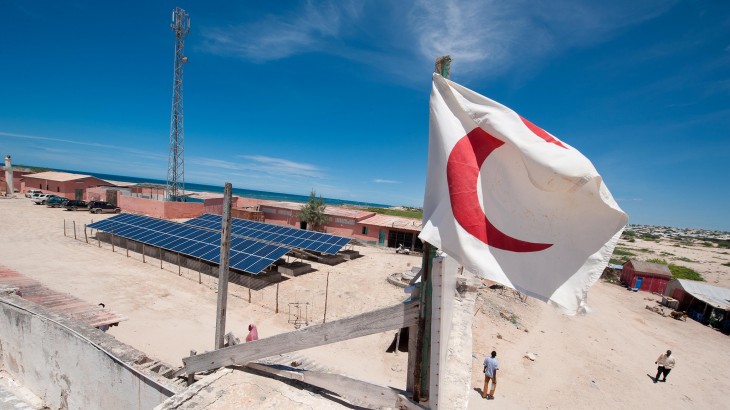Somalia: Working together for humanity

The ICRC has maintained its presence in Somalia since the seventies, responding to the needs of armed conflict victims. The work of the ICRC has been made possible through collaboration with the Somali Red Crescent Society (SRCS) whose extensive local network taps grass root level. Dr Ahmed Mohamed Hassan, president of the SRCS since 1972, understands this relationship all too well. He spoke to ICRC Somalia staff member Rita Nyaga, on his experience working with ICRC.
What is your general view of the ICRC in the country?
 I first joined the Somali Red Crescent as a volunteer for some years before I was elected as its president. At the time, I also served as the director of the Medical Services Department in the Ministry of Health. During this twin assignment l had the opportunity to observe up close the ICRC's operations in Somalia during the Ogaden war in 1977/78, when the ICRC provided humanitarian assistance to tens of thousands of victims, including the displaced and prisoners of war. The same support was given in 1991 when civil war broke out in Somalia and has been going on ever since.
I first joined the Somali Red Crescent as a volunteer for some years before I was elected as its president. At the time, I also served as the director of the Medical Services Department in the Ministry of Health. During this twin assignment l had the opportunity to observe up close the ICRC's operations in Somalia during the Ogaden war in 1977/78, when the ICRC provided humanitarian assistance to tens of thousands of victims, including the displaced and prisoners of war. The same support was given in 1991 when civil war broke out in Somalia and has been going on ever since.
I have thus gained a unique perspective on the way the ICRC approaches its work in Somalia, and the SRCS has continued to work with the organization on many different projects throughout the different phases of the conflict in the country.
The SRCS receives support from many different quarters. What is special about the ICRC?
We believe that the ICRC is our major partner. The degree of cooperation with the ICRC spans over 30 years. We also share similar values, being part of the Red Cross/Red Crescent Movement. This shared history is what makes the continued support from the ICRC special.
Is the SRCS present in all regions?
The Society is present in all regions of Somalia and has 150 sub-branches. For instance, in health, which is our flagship programme, we have 44 mother and child health-care centres in south and central Somalia. Our network across the country allows us to provide health support to far-flung areas. Like other Red Cross and Red Crescent societies the world over, the volunteers who come from the communities we are trying to assist are our main asset.
What challenges do you experience in situations of armed conflict and how do you cope with them?
The greatest challenge for us is consistency in the provision of health services to the people who need it most. We have been forced to close some of our health-care centres by parties in the armed conflict. They need to understand our role as a neutral and impartial humanitarian organization and we continue to remind them of this position.
As president of the SRCS for over three decades, what do you take pride in most?
My legacy as president of the SRCS for 39 years is maintaining the unity of the organization throughout the different phases of the conflict in Somalia. The Society has endured through the ever-changing environment by working with the different political leaders across the divide. This is a sensitive issue which requires us to keep adapting to the different situations in all the regions.
What danger does the nature of the prevailing circumstances pose to the work of the SRCS?
Personally, I have not faced any danger with regard to my life while travelling in Somalia. Unfortunately, a number of SRCS volunteers have been victims of the armed conflict. Together with the ICRC, we are working on a safer access framework which aims to help increase our capacity and preparedness to respond safely and effectively to humanitarian needs in sensitive and insecure contexts.
Does the SRCS receive support from other National Societies?
Yes, we receive assistance from several Movement members.
The Norwegian Red Cross is supporting three physical rehabilitation centres in Hargeysa, Galkacyo and Mogadishu. Our cooperation with the organization, which provides monetary and technical support, dates back to before the war.
The German Red Cross supports Somaliland and Puntland with water and sanitation programmes, and they also run a youth volunteer training programme.
The Swedish Red Cross assists the two branches in Bossasso and Berbera in running several mother child health-care clinics, and they help with mobile clinics in the two regions. Their support comes in the payment of staff salaries and training of office clerks and accountants.
The Qatari Red Crescent has been supporting clinics located in Yogori (Sool region) and Erigavo (Sanaag region). The Iranian Red Crescent supports us on an ad hoc basis, while we also receive assistance from the Finnish Red Cross.
The Red Cross and Red Crescent Movement is universal and the support from other National Societies has clearly shown this.
